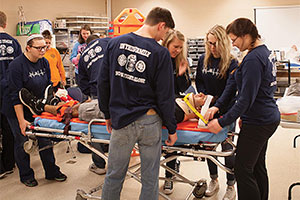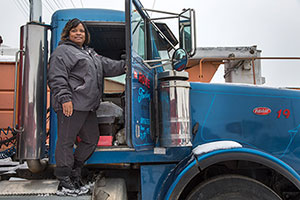Corporate Responsibility
At JPMorgan Chase, we understand that the success of our firm is directly linked to the success of our communities. For us, corporate responsibility is a strategic imperative. By giving more people the opportunity to share in the rewards of a growing economy, we help build the foundation for more prosperous communities – and, in the process, help secure our firm’s long-term future.
The importance of corporate responsibility is reflected in its integration throughout our operations. Our long-term initiatives and programs – backed by significant human and financial capital and informed by our firm’s expertise – are among the most externally visible indicators of the seriousness of our intent. So, too, are the ways in which we actively leverage our core business in service to our communities, deploying the capital and the credit that fuel economic growth.
Bolstering these investments is the tremendous dedication of our people to serve our communities, including the hundreds of employees who applied to the JPMorgan Chase Service Corps, our highly selective program that embeds top-performing employees with many of our nonprofit partners. That so many of our people eagerly throw their hats in the ring to leave their jobs, families and, in some cases, their countries for three weeks to lend their skills to our communities speaks volumes about who we are as a firm.
Underpinning this ethos is a conviction that firms like ours have not only a responsibility and a vested interest in helping solve the challenges facing our communities but also a vital contribution to make. The private sector’s capabilities, ingenuity and assets have time and again demonstrated their capacity to drive transformative change.
JPMorgan Chase has answered this call by reimagining our approach to corporate responsibility. Based on our experience around the world, we have developed and refined a model that is informed by data and based on evidence about what’s most effective at driving inclusive growth. Our conclusion: Arm people with the skills needed for today’s high-quality jobs; provide small businesses – particularly minority-owned and community-based ones – with capital and resources; invest in community development that revitalizes not only urban cores but also surrounding neighborhoods; and give households the tools and resources to manage their financial health. Taken together, these are four fundamental pillars of opportunity – and the focus of our efforts.
Our model also reflects what we have learned are the essential ingredients for creating lasting impact. Critically, it must include a deliberate focus on strengthening the underlying organizations and systems that are needed to empower communities to deliver on – and sustain – change. Equally, it depends on forging meaningful partnerships across the public, private and nonprofit sectors – and then actively leveraging our unique capabilities.
Of course, every company has different assets and experiences to contribute – from Google’s initiatives that harness its employees’ passion for technology to give back to their communities to IBM’s pioneering skilled volunteerism program that demonstrates what can be achieved when firms lend their people’s expertise. Regardless of what we bring to the table, all of us can – and must – embrace the obligation to be a positive force for progress and opportunity in our communities.

Peter Scher
Head of Corporate Responsibility
and Chairman of the Greater Washington Region
A MODEL FOR IMPACT
Driving inclusive growth
More people must have access to opportunity and the chance to move up the economic ladder, particularly in the world’s cities, where the benefits of revitalization are not reaching everyone. To achieve this mission, we have reimagined our approach to corporate responsibility. We are leveraging our firm’s data, global scale, talent and resources to invest in key drivers of inclusive growth: financial health, jobs and skills, neighborhood revitalization and small business expansion.
We continually test, learn and iterate in order to create more widely shared prosperity and to strengthen the underlying systems needed to deliver sustainable change.
A MODEL IN ACTION
Jobs and skills
Helping people get the skills they need to compete in today’s labor market is critical for expanding access to opportunity and promoting economic mobility. Yet even as the global economy improves, people around the world are being left behind.
To help address this challenge, JPMorgan Chase is investing $325 million over five years to provide adults and young people around the world with critical support, education and training to build in-demand skills while providing employers with the workforce they need to grow and compete in today’s economy. As part of these efforts, JPMorgan Chase launched New Skills for Youth in 2016, a $75 million global initiative to expand high-quality, career-focused education programs that lead to well-paying jobs and long-term careers.
 New Skills for Youth is
expanding opportunity for
young people through two
approaches: a multimillion
dollar competition, in
collaboration with the
Council of Chief State School
Officers, which seeks to
incentivize U.S. states to
grow and strengthen their
career and technical
education systems; and,
through global innovation
sites, the development of
career-focused education
programs in cities and school
districts around the world.
New Skills for Youth is
expanding opportunity for
young people through two
approaches: a multimillion
dollar competition, in
collaboration with the
Council of Chief State School
Officers, which seeks to
incentivize U.S. states to
grow and strengthen their
career and technical
education systems; and,
through global innovation
sites, the development of
career-focused education
programs in cities and school
districts around the world.
Communities engaged in 2016:
- Forty-three states and the District of Columbia submitted proposals to participate in the first phase of the competitive program. Of these 44 submissions, we selected 24 states and the District of Columbia and then committed a total of $2.5 million to help them plan and implement long-term career-readiness programs. These states represent half of all K-12 enrollments in the U.S.
- In the second phase of the program in January 2017, we selected 10 states and committed a total of $20 million to help them execute the career-readiness plans they developed during phase one of the initiative. Through ongoing engagement by JPMorgan Chase, these 10 states will have the opportunity to collaborate and learn from each other, receive targeted technical assistance to address their specific challenges, and access lessons, best practices and other research drawn from the initiative.
- Additionally, we have committed a total of $10.5 million to Denver, Detroit and New Orleans to develop and expand innovative apprenticeship models and career-focused programs that equip high school students with the skills and education they need to pursue well-paying, long-term careers.
Neighborhood revitalization
Our community development efforts focus on creating vibrant communities and neighborhoods that offer residents access to opportunity through partnerships, innovative financing and data to address the key drivers of inequality.
Launched in 2016, PRO Neighborhoods, our $125 million, five-year initiative, seeks to identify and support solutions for creating economic opportunity in disadvantaged neighborhoods around the country. PRO Neighborhoods promotes collaboration across sectors and community-based innovators to ensure that economic growth does not stop at commercial corridors but extends into a city’s neighborhoods.
This initiative focuses on three key areas: convening and supporting Community Development Financial Institution (CDFI) collaboratives to work together to address specific community development challenges; providing seed capital that enables partners to develop and preserve affordable housing; and funding research on land use, housing trends and shifting demographics to identify data-driven neighborhood solutions.
In October 2016, JPMorgan Chase announced $20 million for five community development organizations working to create economic opportunity in five U.S. cities: Atlanta, Chicago, Detroit, Miami and New York.
Small business expansion
Small businesses are vital engines of job growth and economic stability in the neighborhoods they serve.
They also have the potential to play a major role in lowering unemployment rates in distressed neighborhoods. Yet many low- and moderate-income small businesses lack access to vital resources needed for success.
 Through our efforts in
Detroit, we have learned
that supporting
underserved entrepreneurs
is essential to the
city’s transformation.
These insights led us to
refine and sharpen our
focus on helping
underserved entrepreneurs
connect with capital to
drive sustainable,
widespread and inclusive
growth.
Through our efforts in
Detroit, we have learned
that supporting
underserved entrepreneurs
is essential to the
city’s transformation.
These insights led us to
refine and sharpen our
focus on helping
underserved entrepreneurs
connect with capital to
drive sustainable,
widespread and inclusive
growth.
In October 2016, JPMorgan Chase more than doubled the size of the global Small Business Forward program, committing $75 million over the next three years to connect underserved small businesses with capital, targeted technical assistance and support networks to help them grow faster, create jobs and strengthen local economies.
As part of these efforts, JPMorgan Chase partnered with LiftFund and committed $4.6 million to support the launch of LiftUP, a new web-based small business lending program to increase access to capital for underserved minority- and women-owned small businesses in the southern U.S. LiftUP will provide small businesses faster access to affordable small business loans, reducing lending approval time from an average of five weeks to four days.
Additionally, JPMorgan Chase partnered with the Association for Enterprise Opportunity and committed $1.9 million to support the advancement of a new technology-enabled platform that will serve as an industry utility connecting small businesses with CDFI lenders when the owners are unable to qualify for traditional loans.
Data and analysis
Almost two years ago, we established the JPMorgan Chase Institute: a global economic think tank dedicated to delivering data-rich analyses for the public good. The Institute utilizes our proprietary data, augmented by firmwide expertise and market access, to provide insights on the global economy and offer innovative analyses to advance economic prosperity.
In 2016, the Institute uncovered fresh insights on:
- Household income volatility, particularly in the wake of extraordinary payments;
- The impact of the online platform economy as a way for consumers to manage this volatility and the slowing participation growth within the online platform economy;
- Consumers’ response to the sustained drop in the price of fuel;
- Small business cash flow and cash reserves (“cash buffer days”) they have on hand to weather financial volatility;
- The economic impact of Daylight Savings Time;
- The role of unemployment insurance and the financial decisions households make after receiving it;
- Nearly a full year of the Local Consumer Commerce Index, measuring consumer spending growth in 15 U.S. cities and in aggregate.
2016 Highlights and Accomplishments
- JPMorgan Chase’s $100 million commitment to Detroit announced in 2014, half of which we are investing in two CDFIs — to fund and catalyze further investment in housing, commercial and manufacturing — has supported more than $270 million in such projects, created or preserved over 800 units of housing and created nearly 800 jobs.
- Announced nine financial services innovators as winners of the second competition of the Financial Solutions Lab aimed at identifying solutions that help consumers prepare for, and weather, financial shocks. Each winner received $250,000 in capital to enhance and scale the availability of their products and services. More than 70 of our employees leveraged their expertise and networks to help the Lab winners improve their products and increase their reach. To date, the Financial Solutions Lab has supported 18 fintech companies offering innovative financial products to help more than 1 million Americans improve their financial health.
- Engaged over 1,800 young people in summer jobs and other work-related experiences in 21 cities across the U.S.
- Underwrote more than $5 billion in green, social and sustainability themed bonds and facilitated over $1.9 billion of capital for renewable energy projects in the U.S.
- Committed to strengthening apprenticeship systems around the world through a $9 million investment by supporting the development of innovative fields; expanding existing high-quality programs to serve young people from disadvantaged backgrounds; and bolstering the case for private investment in apprenticeship through first-of-its-kind research measuring the employer return on investment for apprenticeship programs.
- The talent and expertise of our people are key components of our model for impact and are central to all of our efforts. In 2016, 50,000 of our employees volunteered more than 325,000 hours of their time. And through the JPMorgan Chase Service Corps, 64 employees applied their skills and expertise to help our nonprofit partners expand their capacity, contributing more than 9,600 hours with an approximate market value of $1.4 million.
